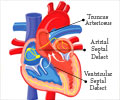
‘By manipulating the right genes, these heart muscle cells are converted to a more fetal state which opens up new potentials for treating heart disease.’
Tweet it Now
Cell proliferation is essential for tissue regeneration, so Martin and his colleagues have been investigating how to manipulate the genetic mechanisms that prevent cardiomyocyte proliferation in order to promote the repair of injured hearts. The researchers had previously shown that the Hippo pathway stops cardiomyocyte proliferation by inhibiting the activity of the YAP pathway. In this study, the researchers developed a mouse model expressing in adult cardiomyocytes a version of YAP called YAP5SA that is impervious to the inhibitory influence of Hippo.
"We showed that by expressing YAP5SA, we could reprogram these highly specialized adult cardiomyocytes to look more like embryonic cells. The reprogrammed cells also can proliferate and the new cells make connections with pre-existing cardiomyocytes," said Martin, who also is director of the Cardiomyocyte Renewal Lab at the Texas Heart Institute.
Reprogramming of adult cardiomyocytes had not been done in live animals before, explains Martin.
"This study shows that it is possible to push those very specialized cells back to a more fetal state by manipulating the right genes," Martin said. "And this opens possibilities for treating heart disease by reprogramming cardiomyocytes."
Advertisement
Source-Eurekalert













